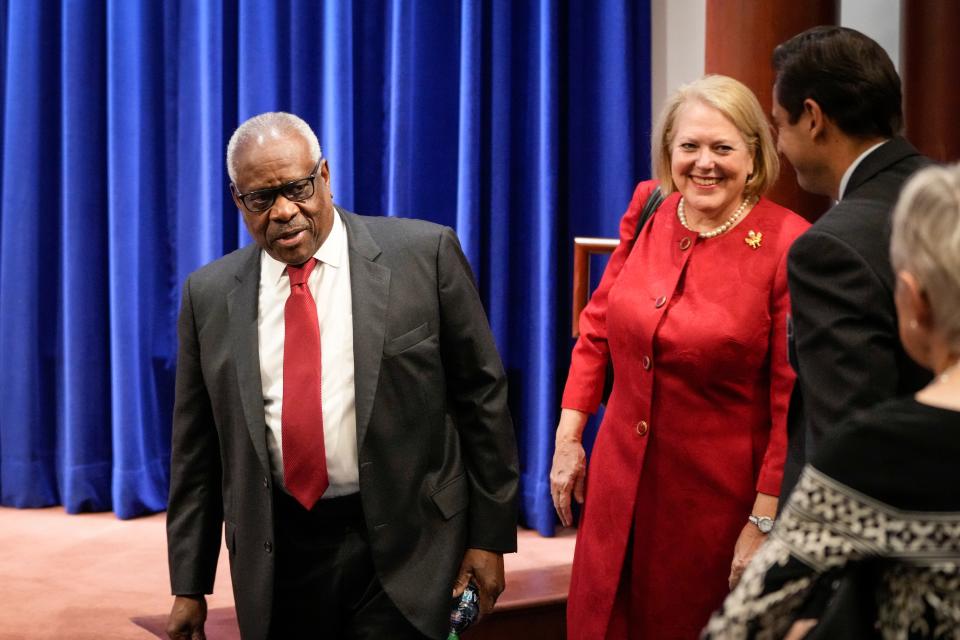Clarence Thomas has no business deciding whether Trump stays on the ballot
- Oops!Something went wrong.Please try again later.
- Oops!Something went wrong.Please try again later.
- Oops!Something went wrong.Please try again later.
Before the U.S. Supreme Court hears arguments on the Colorado high court’s decision finding Donald Trump ineligible to appear on the state primary ballot, one other important question deserves debate:
Should Justice Clarence Thomas recuse himself from hearing the case, scheduled for Feb. 8?
Justice Thomas’ wife, Virginia Thomas, testified before the congressional select committee looking into the Jan. 6 insurrection.
She admitted that she sent texts to then-White House chief of staff Mark Meadows encouraging him to support Trump and his unsupported claims that there was widespread fraud in the 2020 election.
In fact, she called the election a “heist.”
Thomas and his wife have Jan. 6 ties

She and Justice Thomas are longtime associates of lawyer John Eastman, a former clerk of the justice who according to CBS News is one of the architects “of the scheme to have several 2020 battleground states send alternative electors for Trump, rather than Biden.”
Furthermore, Virginia Thomas was on the board of directors of a political group that helped organize and lead the “Stop the Steal” movement, which ended in the Jan. 6 violent attack on the Capitol that the Colorado Supreme Court found to be an insurrection.
She attended the “Stop the Steal” rally that occurred before the storming of the Capitol.
In October, Justice Thomas recused himself in a case involving the attempt by Eastman to quash a subpoena from the now-defunct Select Committee to investigate the Jan. 6 attack on the U.S. Capitol.
However, he refuses to recuse himself from other Jan. 6-related cases, including whether Trump has presidential immunity from federal prosecution.
This screams 'conflict of interest'
But how can Justice Thomas render a fair and impartial decision in the Colorado case when his wife was so intimately involved in the circumstances leading up to the insurrection?
At its worst, this situation screams conflict of interest and at best, has the appearance of impropriety.
Will the Supreme Court’s new Code of Conduct adopted on Nov. 23, force Thomas to recuse himself from the Colorado case?
Why that win in Iowa: Could spell trouble for Trump
Under Canon 3B, a justice is now disqualified if his or her spouse is known to have a financial interest or "any other interest that could be affected substantially by the outcome of the proceeding.”
It seems clear from the plain language of the canon that Thomas should be disqualified from hearing the Colorado case.
Code of conduct makes recusal optional
Unfortunately, the new code also includes several newly adopted provisions that combined makes recusal basically optional, even where it appears to be required.
For example, Canon 3B(3) contains a “rule of necessity,” which overrides the rule of disqualification and essentially means recusal decisions are left to the individual justice rather than the court.
The commentary to the canon explains that necessity includes importance — thus, a justice can decide whether his participation is more important than his conflicting interest.
Fifty years ago, the Code of Conduct was promulgated for federal judges — other than the United States Supreme Court justices — by the Judicial Conference of the United States. All Arizona state judges are subject to their own Code of Conduct, which was established in 1971.
Both codes of conduct were adopted to promote public trust and confidence in the integrity, independence and impartiality of the judiciary. And both would require disqualification of a judge in this situation where the judge's spouse has an interest that could be substantially affected by the outcome of the proceeding.
Thomas gets to decide this one himself
Given that the U.S. Supreme Court is the court of last resort, shouldn’t the institution be subject to more scrutiny, not less?
Alas, Justice Clarence Thomas will make his own decision on whether to recuse himself or not.
Since there is no enforcement mechanism in the Code of Conduct for the United States Supreme Court, there is no oversight or accountability.
Thus, integrity, independence and impartiality are fanciful hopes and dreams, not requirements.
Barbara Rodriguez Mundell served as a judge in Maricopa County Superior Court for 19 years and was the court’s presiding judge from 2005-2010. She is a member of the Board of Contributors for The Arizona Republic. Reach her at barbaramundell@gmail.com.
This article originally appeared on Arizona Republic: Clarence Thomas must recuse himself from Trump's ballot case

